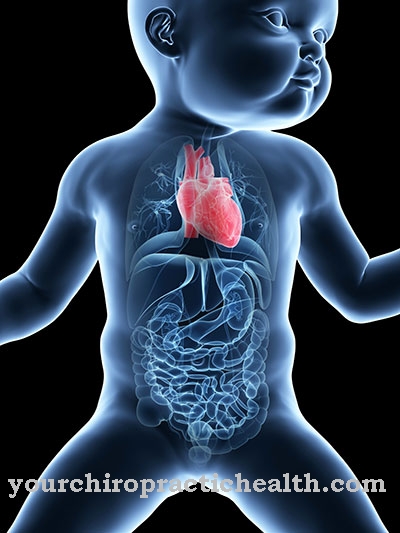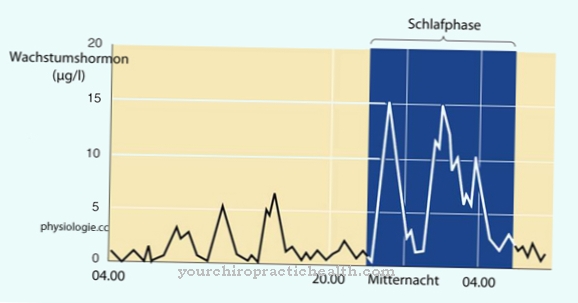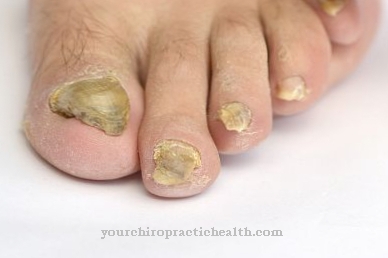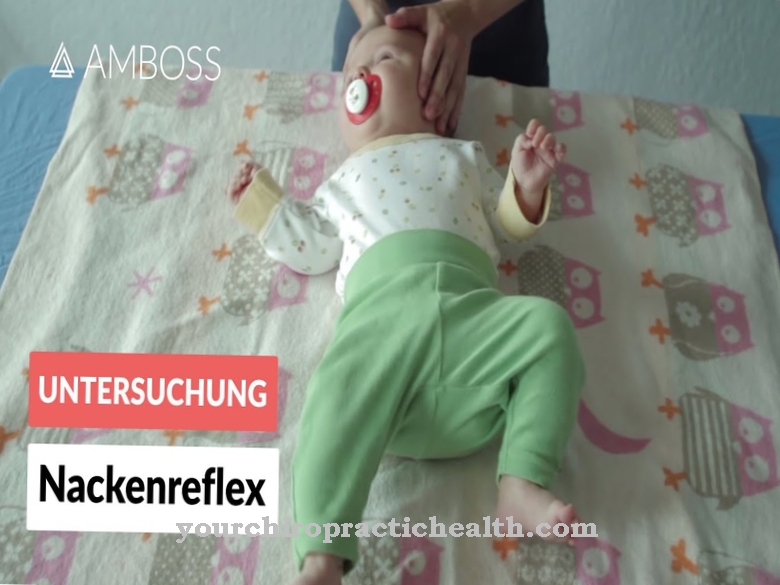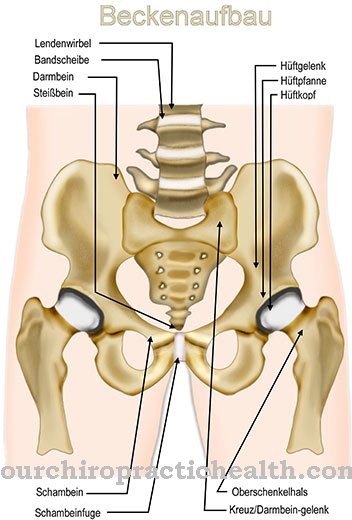Failure to thrive Due to the regular preventive examinations, babies are no longer present in health-endangering dimensions. However, if there is any indication that a child is not thriving properly, medical help is essential.
What is failure to thrive?

© Zffoto - stock.adobe.com
Failure to thrive is when an infant or toddler does not seem to develop in an age-appropriate manner. With newborns, this is determined by the weight curve.
In the first few months of life, you should gain an average of 200 grams per week. If this average value is kept well below this, there may be a failure to thrive. Failure to thrive in infancy is determined not only by weight and height, but also by motor and linguistic development behavior.
For example, if motor development is extremely slowed, if weight and height are below average at the same time, there may be a failure to thrive.
causes
The causes of failure to thrive in infants are usually due to insufficient food intake. Breastfeeding is still clearly the best food for infants and is also naturally high in calories.
When breastfeeding is going well, it gives a baby all the energy it needs. Breastfeeding problems, including those that the mother does not notice at first, can also be the cause of failure to thrive. Other causes can be insufficient energy and nutrient absorption through the porridge. Complementary foods are usually started between the 5th and 7th month of life.
If breastfeeding is then weaned or the milk bottles are reduced, although the child is not yet eating enough porridge, the weight curve can drop significantly. This can be associated with a slowdown in development during this phase. Even in later childhood, failure to thrive can usually be traced back to the affected children not eating enough or primarily consuming empty calories.
Symptoms, ailments & signs
Failure to thrive relates to a child's overall physical development. Overall, the affected children are too light for their age and size. They are either lighter than 97 percent of the children in their age group or their weight gain is slower than that of the other children over the long term. If the patient fails to thrive for a long time, the growth in length is also impaired.
It is often assumed that if the children remain very thin, they will fail to thrive. But this is not the case if the growth in length is normal and the children are still productive. In these cases too, the body is adequately supplied with energy and nutrients. In the case of failure to thrive, however, not only are weight and growth delayed, but also cognitive, mental and motor development.
In addition to a lack of energy, the body of these children also suffers from a lack of important proteins, minerals, trace elements and vitamins. Failure to thrive leads not only to growth retardation but also to fatigue and listlessness. In addition, the children also suffer from the symptoms of the underlying diseases.
On the one hand, this can be digestive disorders due to food intolerance such as celiac disease, malabsorption in the case of stomach and intestinal diseases or food allergies. On the other hand, failure to thrive also occurs in mental illnesses that are associated with eating disorders. These include anorexia, autism, or intellectual disabilities.
Diagnosis & course
Failure to thrive can be gradual. Especially with the first child and in the first weeks of life, parents do not have much experience and often no direct comparison with other babies, how they thrive. Because of this, it is not always immediately noticeable when a child is not thriving properly.
For this reason, the diagnosis of failure to thrive is often given to the pediatrician for the first time. During the regular check-ups, the children are measured and weighed, and the head circumference is also recorded. From these values, the pediatrician can read which percentile curve the baby or toddler is moving. Anything below the percentile curve is considered underweight or significantly too small. In this case, the further development must be observed more closely.
Complications
As a rule, failure to thrive can lead to very serious complaints and complications for the child. In the worst case, the child will die due to the failure to thrive if it is not treated or if treatment is delayed. This often leads to malnutrition and thus to an insufficient supply of important nutrients and vitamins.
The child's development is restricted as a result and cannot proceed normally. For this reason there are disturbances in growth and also disturbances in mental development and intelligence. In the case of persistent failure to thrive, retardation also occurs, which can usually no longer be corrected in adulthood.
In most cases, failure to thrive can be treated relatively well, although the mother must always seek medical advice to prevent consequential damage. An adequate and healthy diet can avoid complications so that there are no further complaints. The life expectancy of the child is not affected if the disorder is recognized and treated in good time. In some cases, the parents suffer from mental health problems due to the failure to thrive.
When should you go to the doctor?
If a child's failure to thrive is noticed by relatives or people in the immediate vicinity, a doctor should be consulted. If the child has a developmental disorder, it is necessary that check-ups are initiated in good time.
If the child shows significant delays in development in direct comparison to their peers, a doctor should be consulted. If the growth is reduced, the cognitive abilities are clearly reduced or a learning disability is recognizable, the observations must be clarified by a doctor.
If concentration disorders occur, if the child's attention is unusual, if orientation problems occur or if memory disorders occur, a doctor is needed. If the child tends to become socially isolated and turns away from their peers, family members or other people around them, it is advisable to contact a doctor. Behavioral problems such as aggressive behavior, refusal to eat or disturbances in processing information and irritation of the environment are worrying.
If the refusal to eat leads to malnutrition or if an eating disorder develops, a doctor must be consulted. Skin abnormalities, regulation problems and irregularities of the metabolism should be examined and treated by a doctor. In the event of apathy, sleep disorders, the development of fears, apathy or a decrease in the joy of life, it is necessary to consult a doctor.
Doctors & therapists in your area
Treatment & Therapy
To effectively treat failure to thrive, it is necessary to understand its causes. This has to be started medically. If, for example, it turns out that breastfeeding problems are the cause of the failure to thrive, this should and does not have to mean weaning.
The pediatrician and midwife can give the mother important tips on increased milk production. A fixed pattern for placing on the breast can also be helpful in order to further stimulate milk production and thus provide the baby with more high-calorie food. Regular weighing, which should not degenerate into compulsion, ensures the success of the treatment.
In some cases it may also be necessary in babies to feed them at least in phases until the weight curve and overall development are satisfactory again. If a toddler suffers from a failure to thrive, the daily menu must first be analyzed.
Small children often have phases in which they want to eat little but at the same time have a high urge to move. This can cause the weight curve to crash. High-calorie meals, for example, a lot of milk, can often fix a failure to thrive quickly. Regular checks are also important here.
Outlook & forecast
Failure to thrive are serious side effects of an underlying disease. They can mean that the baby will continue to struggle with the sequelae for several years to come. However, children at this age already have great powers, so that failure to thrive, with appropriate treatment and early detection of the underlying disease, may just as well have no impact on health in childhood or adulthood.
The attending pediatrician can provide an exact prognosis, because this depends on the underlying disease, the general health of the baby, body weight and the time of birth. In the case of failure to thrive, it is important not only to consider what they do to a baby's physical health, but also to psychological development.
If, for example, it is necessary from a medical point of view to admit the baby as an inpatient or to put a premature baby in an incubator, this is good for physical health, but still means a certain separation of mother and child.This can have a negative effect on the mental development of the child and have consequences for the development of a good mother-child bond.
When treating failure to thrive and the underlying illnesses that trigger it, care should be taken to ensure that the baby can develop as normally as possible during this period, that it is supported according to its possibilities and that the mother-child bond does not suffer from the situation.
prevention
Breastfeeding mothers can best prevent possible failure to thrive by studying breastfeeding before they are born. Breastfeeding groups, for example, offer lots of tips and tricks for beginners. If you know what to look out for at the beginning, things often work out much better and failure to thrive occurs less often.
The midwife is an important help to every mother. In the event of problems, she can also accompany the young family beyond the eighth week of life. Midwives also advise on nutritional issues. If a failure to thrive is suspected, going to the pediatrician is also a good preventative measure. If it really detects that there is a disturbance in the thriving process, you can take appropriate countermeasures immediately before the thriving is seriously endangered.
Aftercare
Failure to thrive is a very serious and life-threatening disease that urgently requires medical supervision. Only after successful treatment should all measures be taken so that the failure to thrive does not recur. Other follow-up options are usually not possible.
In the event of this complaint, the affected child must first be provided with food to compensate for the symptoms of the disorder. Food should be consumed that is relatively high in calories to provide the child with energy. Furthermore, regular examinations by a midwife or a pediatrician are necessary in order to detect damage to the child's body and continue to treat it at an early stage.
The doctor must also look at the child's menu in order to clear up any possible misunderstandings among the parents. In many cases, contact with other parents is also useful, as this can lead to an exchange of information that is useful for everyday life. Failure to thrive can usually be treated well. Support from your own family or friends also makes sense with this disease.
You can do that yourself
In most cases, failure to thrive can be avoided. There are also various means of self-help available to patients during treatment, which can limit the symptoms.
After giving birth, the mother should deal directly with breastfeeding. Useful information can be obtained directly from the hospital or from breastfeeding groups. In this way, the disturbances can be completely avoided in most cases. The midwife can also provide assistance and advise on proper and healthy nutrition.
The earlier a failure to thrive is recognized, the faster and easier it can be treated again. In the case of failure to thrive, milk production should be stimulated. Regular and frequent weighing of the child can also counteract this disorder. Because there are often difficulties feeding small children and babies.
If there is a high urge to exercise, the diet should be in the form of a high-calorie meal. However, parents should always keep a healthy weight and eat a healthy diet.
If you have any questions, it is always advisable to contact a doctor directly. Direct medical treatment of the failure to thrive is only necessary in a few cases.

.jpg)
.jpg)


